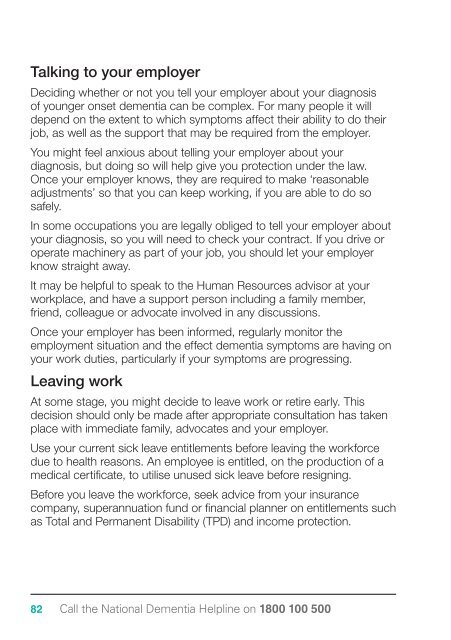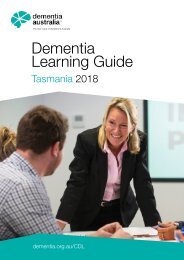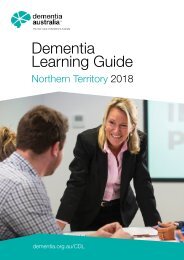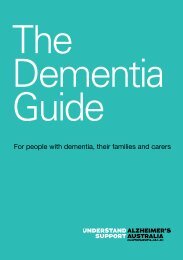Dementia Australia | The Dementia Guide
The Guide will also be used by the family and friends of someone with dementia, as it will contain information for anyone taking on a caring role. It will help people to understand more about dementia and the emotional impact of a diagnosis, the available drug treatments, and support and services that are available. It will include information about living well with dementia and about making plans for the future.
The Guide will also be used by the family and friends of someone with dementia, as it will contain information for anyone taking on a caring role. It will help people to understand more about dementia and the emotional impact of a diagnosis, the available drug treatments, and support and services that are available. It will include information about living well with dementia and about making plans for the future.
Create successful ePaper yourself
Turn your PDF publications into a flip-book with our unique Google optimized e-Paper software.
Talking to your employer<br />
Deciding whether or not you tell your employer about your diagnosis<br />
of younger onset dementia can be complex. For many people it will<br />
depend on the extent to which symptoms affect their ability to do their<br />
job, as well as the support that may be required from the employer.<br />
You might feel anxious about telling your employer about your<br />
diagnosis, but doing so will help give you protection under the law.<br />
Once your employer knows, they are required to make ‘reasonable<br />
adjustments’ so that you can keep working, if you are able to do so<br />
safely.<br />
In some occupations you are legally obliged to tell your employer about<br />
your diagnosis, so you will need to check your contract. If you drive or<br />
operate machinery as part of your job, you should let your employer<br />
know straight away.<br />
It may be helpful to speak to the Human Resources advisor at your<br />
workplace, and have a support person including a family member,<br />
friend, colleague or advocate involved in any discussions.<br />
Once your employer has been informed, regularly monitor the<br />
employment situation and the effect dementia symptoms are having on<br />
your work duties, particularly if your symptoms are progressing.<br />
Leaving work<br />
At some stage, you might decide to leave work or retire early. This<br />
decision should only be made after appropriate consultation has taken<br />
place with immediate family, advocates and your employer.<br />
Use your current sick leave entitlements before leaving the workforce<br />
due to health reasons. An employee is entitled, on the production of a<br />
medical certificate, to utilise unused sick leave before resigning.<br />
Before you leave the workforce, seek advice from your insurance<br />
company, superannuation fund or financial planner on entitlements such<br />
as Total and Permanent Disability (TPD) and income protection.<br />
82 Call the National <strong>Dementia</strong> Helpline on 1800 100 500












